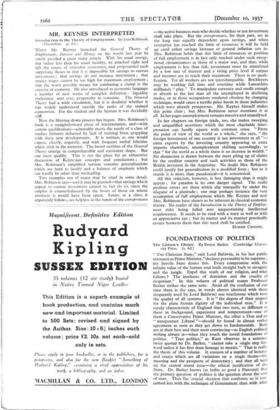MR. KEYNES INTERPRETED
Introduction to the Theory of Employment. By Joan Robinson. (Macmillan. 4s. 6d.)
WHEN Mr. Keynes launched the General Theory of Employment, Interest and Money on the world last year he sorely puzzled a great many people. With his usual energy, but rather less than his usual lucidity, he attacked right and left the tenets of orthodox economics, and propounded such surprising theses as that it is impossible for savings to outrun investment ; that savings do not increase investment;, that money wages cannot be too high for maximum employment ; that the worst possible means for combating a slump is the exercise of economy. He also introduced to economic language a number of new terms of complex definition : liquidity preference, user cost, propensity to consume. The General Theory had a wide circulation, but it is doubtful whether it was widely understood outside the ranks of the trained economists. For the student and the layman it was decidedly stiff.
Now the filtering-down process has begun. Mrs. Robinson's book is a straightforward piece of interpretation, and—with certain qualifications—admirably meets the needs of a class of readers hitherto debarred by lack of training from grappling with these new developments. It is written, as one would expect, clearly, cogently, and with frequent verbal felicities which stick in the memory. The broad outlines of the General Theory emerge in comprehensible and consistent shape. But one must qualify. This is not the place for an exhaustive discussion of Keynesian concepts and conclusions ; but Mrs. Robinson's simplified version contains generalisations which are hard to justify and a balance of emphasis which can hardly be other than misleading.
Two examples out of many may be cited in some detail. Mrs. Robinson says—and it maybe granted—that savings which appear to outrun investment cannot in fact do so, since the surplus is counterbalanced by the losses of those on whose products it would have been spent. Savers as a class, it apparently follows, are helpless in the hands of the entrepreneurs —the active business men who decide whether or not investment shall take place. But the entrepreneurs, for their part, are in the long inn equally dependent upon savings; and when enterprise has reached the limit of resources it Will be held up until either savings increase or general inflation sets in. Mrs. Robinson holds that this limit of resources or position of full employment is in fact only reached under such excep- tional circumstances as those of a major war,'and that, while employment is less than full, investment must be sun:misted by a low rate of interest and a' rising price level if output and incomes are to reach their maximum. There is no quali- fication. Yet all workers are not interchangeable. Bricklayers may be working full time and overtime while Lancashire millhands "play." To manipulate currency and credit enough to absorb to the last man all the unemployed in declining trades, or in those occupations rendered obsolete by changing technique, would cause a terrific price boom in those induitries which were already prosperous. Mr. Keynei himself makes this point clear ; but Mrs. Robinson never mentions it at all. In her pages unemployment remains massive and unanalysed.
In her chapters on foreign trade, too, she makes sweeping and unqualified assertions which the most charitable inter- pretation can hardly square with common sense. "From the point of view of the world as a whole," she says, "the foreign investment of one country is not investment at all "- extra exports by the investing country appearing as extra imports elsewhere, unemployment shifting accordingly, so that " for the world as a whole there is no increase in wealth."
No distinction is drawn- between the mere piling up of claims by the creditor country and such activities as those of the British investors in the Argentine. No doubt Mrs. Robinson could justify her generalisation in a modified form; but as it stands it is More than paradoxical—it is nonsensical.
All this criticism, however, is less damaging than it might appear ; for paradox is its own danger signal. The really perilous errors are those which slip tranquilly by under the disguise of a platitude ; one may perhaps instance the very assumption of full employment which Mr. Keyriei and now Mrs. Robinson have shown to be inherent in classical economic
theory. No reader of the Introduction to the Theory of Employ- ment risks being lulled into unquestioning • intellectual acquiescence. It needs to be read with a wary as well as with an appreciative eye ; but its matter and its manner practically ensure between them that this need shall be satisfied.
HONOR CROOME.






















































 Previous page
Previous page